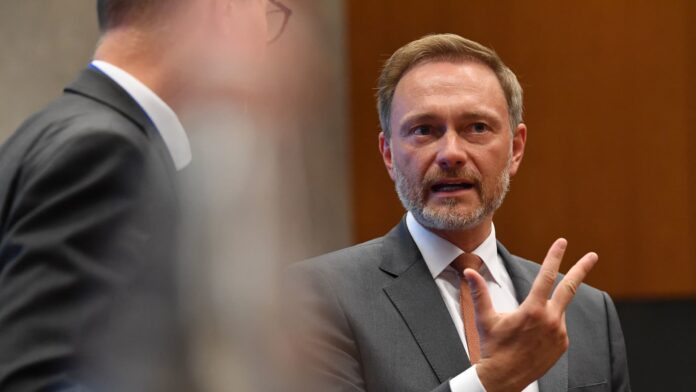German Minister of Finance Christian Lindner said there is no need for concern about the stability of the euro zone.
John Thys | Afp | Getty Images
LUXEMBOURG — There is no need for markets to be worried about the stability of the euro zone, Germany’s finance minister told CNBC Thursday following a recent surge in borrowing costs for many governments in the region.
Yields for several peripheral euro nations rose last week after the European Central Bank suggested it would tighten monetary policy aggressively, but failed to announce any measures to backstop and support the more highly indebted nations. This created unease among investors, who fear fragmentation in the region, and pushed the yield on the Italian 10-year bond above the 4% threshold for the first time since 2014.
“The euro zone is stable, the monetary union has [a] robust character, we have institutions, and we are considering measures to fight inflation, fostering growth and to safeguard the macroeconomic stability. Yes of course, we are witnessing some rising spreads amongst the member states, but there is no need for any concern,” Christian Lindner, Germany’s finance minister, said.
“In the long-term perspective if you compare interest rates and spreads of today with interest rates or spreads some months or some years ago there is no need for anyone to get nervous. Our unity and our institutions, they make me confident that we could overcome any critical situation.”
The ECB looked to reassure markets by convening an emergency meeting Wednesday. The euro zone’s central bank said it would be creating a new tool to address fragmentation risks, but there is no information on what type of instrument this will be and when it will be applied. The outcome provided some relief to borrowing costs in the euro zone but it failed to give investors the details they wanted.
Bring your budgets in order.
Magnus Brunner
Austria finance minister
ECB President Christine Lagarde joined euro zone finance ministers meeting in Luxembourg Thursday to provide more detail on the central bank’s actions.
Austria’s Finance Minister Magnus Brunner, a fiscally-conservative politician, said he was “very concerned” about the recent rise in yields and had one message to his counterparts: “Bring your budgets in order.”
One of the main challenges for the euro zone (where nations share the single currency) is that it has one central bank establishing monetary policy, but 19 different countries with various fiscal positions.
“The ECB has to have more possibilities and the ECB can only have possibilities if all the budgets in all member states are in shape,” Brunner said.
Fiscal consolidation in the euro area is not at the top of the agenda for now. The bloc suspended its fiscal rules in the wake of the coronavirus pandemic, so capitals would have more leeway to spend more and tackle the new economic reality. This pause is continuing for at least until the end of 2023 as the war in Ukraine brought new challenges, most notably higher inflation. The idea with this continued suspension is to support governments in addressing higher food, petrol and other costs.
Nonetheless, for Germany’s Lindner, it is clear that “we all need to return to sound public finances.”
“We have to take our responsibilities as finance ministers as well,” he told CNBC.
The European Commission, the executive arm of the EU, forecast in May a growth rate of 2.7% for the euro area in 2022 and 2.3% for 2023.
However, other institutions are slightly more downbeat on their economic prospects. The OECD expects a 2.6% growth rate for this year and 1.6% for next year.
The European Commission is so far avoiding talk of recession in the euro area. Speaking to CNBC in Luxembourg, EU Economics Commissioner Paolo Gentiloni said that a recession isn’t inevitable, but admitted: “We are navigating troubled waters.”
“This doesn’t mean our view is that a recession is inevitable, but of course this means that we will have to concentrate our fiscal policies, in reforms, in investments, in a prudent policy, especially for countries with a high level of debt,” he said.
A new euro member
In the meantime, the euro zone is about to have a new member.
Earlier this month, Croatia, which joined the European Union in 2013, received a greenlight to join the euro zone in January next year. The euro area has not expanded since 2015.
Speaking to CNBC, Zdravko Marić, Croatia’s finance minister said his country has done “a lot in last couple of years” to fulfil all the criteria.
“We believe that it’s very beneficial for Croatia … the benefits are much bigger than the potential costs,” he said.
“But we also strongly believe that Croatia, as [the] youngest member state of the European Union can also bring more value to [the] euro zone and help and assist. And in a way show [a] very clear signal [that] deeper integration of [the] European Union is happening, despite many, many challenging, I will say, circumstances.”


